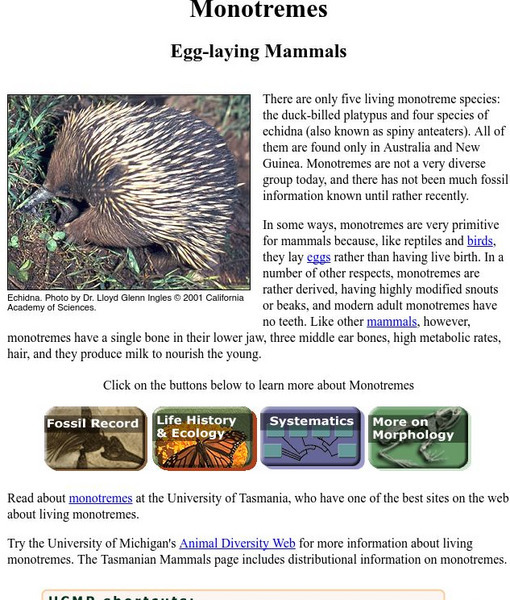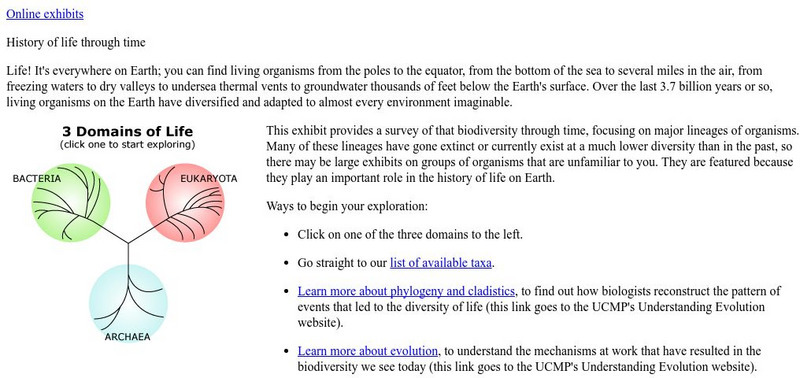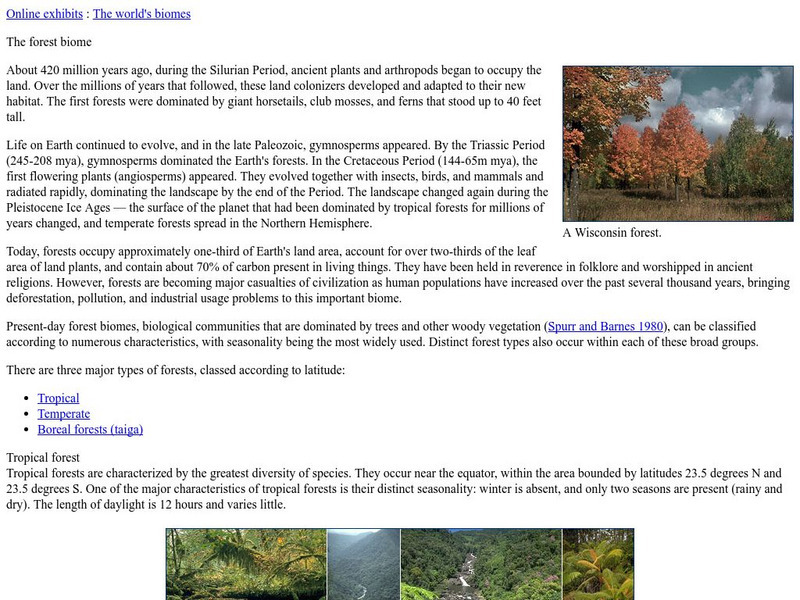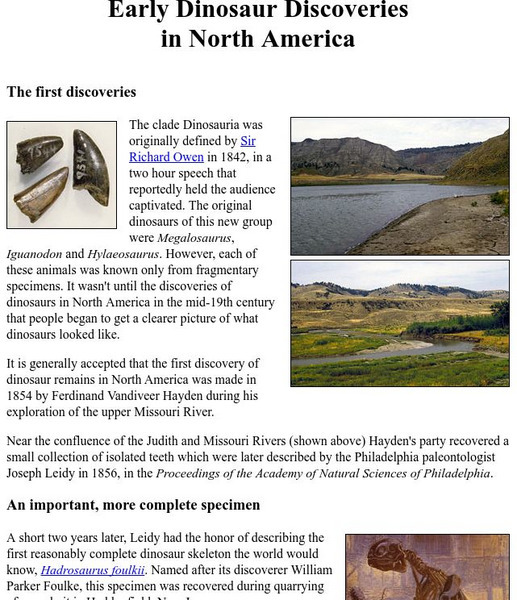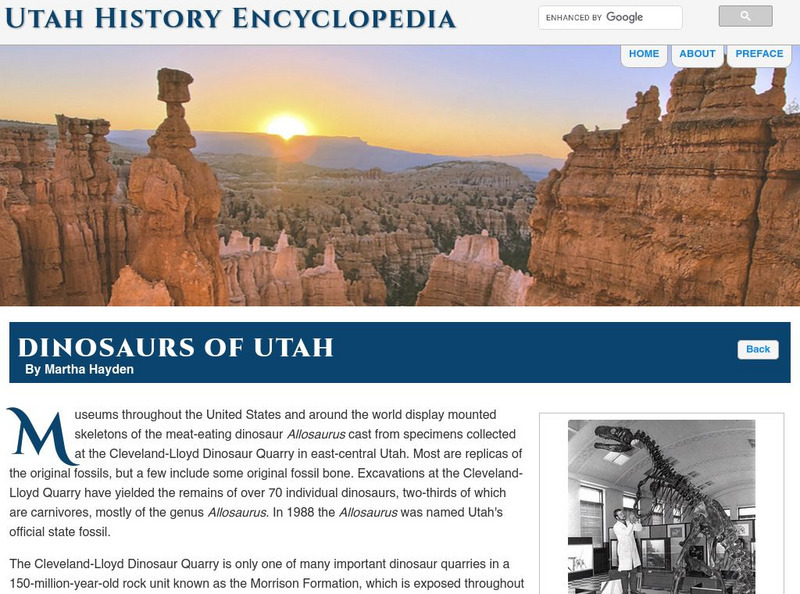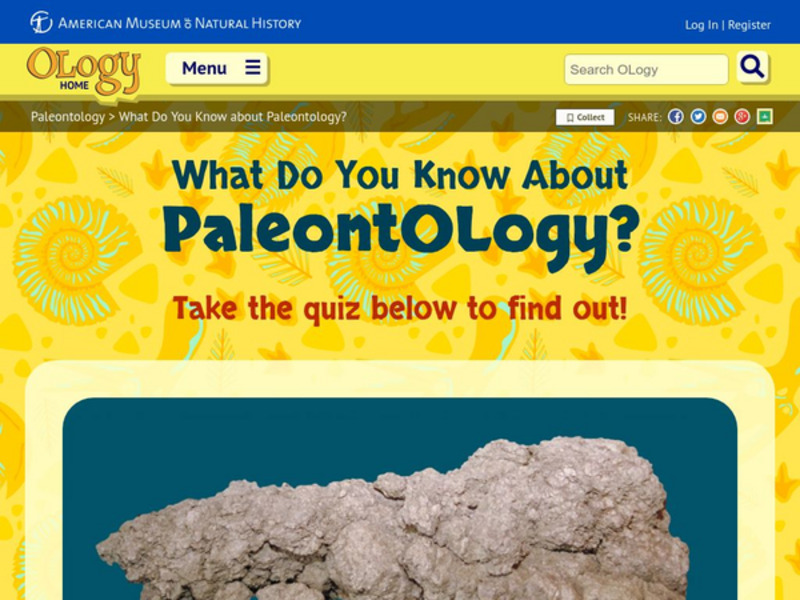University of California
Ucmp: Monotremes, Egg Laying Mammals
University of California Berkeley offers a short, concise description about egg-laying mammals with links to more in-depth information.
University of California
Ucmp: Glossary of Natural History
A glossary of useful terms, including "abyssal plain" and related terms.
University of California
Ucmp: The Biosphere: Life on Earth
Learn about different forms of life that coexist with us on Earth. This Berkeley article provides links to brief write-ups on the three domains of living organisms: Eukaryota, Bacteria, and Archaea.
University of California
Ucmp: Introduction to Trilobita
One of the most famous fossil organisms, trilobites were once a complex group. Learn to tell them apart in this illustrated article that tells how they lived, their body structure, there place in evolution, and the like.
University of California
Ucmp: A History of Evolutionary Thought
Museum site note on the history of evolutionary thought and includes scientists and thinkers who have contributed to our understanding of life on Earth. Links are provided for da Vinci, Linneaues, Erasmus Darwin, and others.
University of California
Ucmp: Welcome to the Dinobuzz
Site details with the current topics concerning dinosaurs. Site covers dinosaur speeds, dinosaur extinction, warm-blooded dinosaurs and more.
University of California
Ucmp: More on Morphology
A concise site that describes the four basic features that all chordates share.
University of California
Ucmp: Creating an Earth System: Interactions in the Earth System
A brief description of the four spheres of the Earth, with an activity where students brainstorm interactions among them.
University of California
Ucmp: Haracteristics
Brief, but thorough overview of the temperate deciduous forest. Lists of flora and fauna found in the forest.
Smithsonian Institution
Smithsonian Learning Lab: Fossils: Footprints Across Time
Smithsonian Education presents "Fossils: Footprints Across Time." Teachers can download this teaching package that introduces students to the study of fossils. Students will discover what fossils can teach us about the Earth as it was...
University of California
Ucmp: Early Dinosaur Discoveries in North America
This survey of early dinosaur discoveries in North America discusses the first dinosaur specimens and the scientific debate that they inspired.
University of California
Ucmp: Placental Mammals
This brief article defines "placental mammals," lists examples of these animals, and describes the characteristics which render their classification.
Curated OER
Dr. Tim Rowe Poses With Elephant Bird Egg.
"A scanning device most commonly seen in hospitals is reshaping the science of paleontology by allowing researchers to peer inside irreplaceable fossils without damaging them." Find out what scientists are now able to see that they've...
Curated OER
Cat Scan Image of the Insides of an Elephant Bird Egg.
"A scanning device most commonly seen in hospitals is reshaping the science of paleontology by allowing researchers to peer inside irreplaceable fossils without damaging them." Find out what scientists are now able to see that they've...
Curated OER
Fossilized Skull of Archaeopteryx
"A scanning device most commonly seen in hospitals is reshaping the science of paleontology by allowing researchers to peer inside irreplaceable fossils without damaging them." Find out what scientists are now able to see that they've...
Other
Bio Web Evolution: Homepage
This site from BioWeb Evolution was originally created as a ThinkQuest entry, and it has some good basic information about evolution. This page is on fossils and geologic time.
Other
Dinosaur Extinction: One More Hypothesis
"The survivals and extinctions at the close of the Cretaceous are such as might be expected to result from intensely hot winds such as would be generated by extra large meteoritic impacts." This article suggests that this theory should...
Treehut
Suzy's World: What Is a Fossil?
This site, which is a personal site from Suzy's World by Suzy Cato, explores fossils. Find out some basic facts about fossils, including who studies them and what they are made of. A fun experiment is also included.
American Geosciences Institute
American Geosciences Institute: How Do Paleontologists Identify Fossils?
Learn about the methods that paleontologists use to identify fossils.
Utah Education Network
Uen: Utah History Encyclopedia: Dinosaurs of Utah
Learn why Utah is known as a prime location for the discovery of dinosaur fossils and why, in 1988 the Allosaurus was named Utah's official state fossil.
ClassFlow
Class Flow: Dinosaurs
[Free Registration/Login Required] This flipchart can be used to spring discussions on fossils, geography, adaptations, as well as different kinds of dinosaurs. This can be a companion to The Magic School Bus chapter book, Dinosaur...
Other
Sternberg Museum of Natural History
This site contains many links as well as a description of the museum.
American Museum of Natural History
American Museum of Natural History: O Logy: What Do You Know? Dinosaurs
Test knowledge about dinosaurs with this ten question quiz.
American Museum of Natural History
American Museum of Natural History: Living Large
This engaging game about dinosaurs allows students to analyze and interpret fossil data, as well as engage in argument from evidence. The game helps students to understand that fossils provide evidence about the types of organisms that...
Other popular searches
- Paleontology Dinosaurs
- Paleontology Fossils
- Paleontology Hominid
- Paleontology Math
- Fossil Paleontology
- What Is Paleontology
- Paleontology Seas
- Paleontology and Dinosaurs
- Paleontology Vocab
- Marsh Paleontology
- Paleontology Unit
- Social Studies Paleontology


